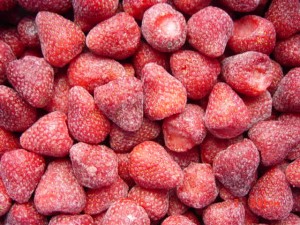Cypriot inspectors found arsenic in the frozen calamari. The Italians discovered maggots in the pasta. There were glass chips in the pumpkin seeds bound for Denmark, and Spanish regulators blocked a shipment of frozen duck meat because of forged papers. It has been a rough year for Chinese food exports to Europe.
At least German kids can eat their Chinese strawberries again.
Health authorities have given the all-clear after a recent poisoning of 11,000 children at hundreds of schools in Berlin and four other German states. A norovirus outbreak from a  shipment of frozen Chinese berries led to severe diarrhea and vomiting, and 30 people were hospitalized.
shipment of frozen Chinese berries led to severe diarrhea and vomiting, and 30 people were hospitalized.
German consumer agencies traced the outbreak to a single batch of berries. School cafeterias in eastern Germany were primarily affected, and improper food handling at industrial kitchens was seen as a possible cause.
The agencies’ strawberry statement did not identify the source country, although a spokesperson for the Federal Office of Consumer Protection and Food Safety told Food Production Daily that the berries “all came from the same batch imported from China.”
And a news report said the strawberries were grown, harvested and frozen in Qufu, the birthplace of Confucius, in Shandong Province.
It was the latest episode in China’s ongoing food-safety nightmare, which Rendezvous has chronicled, and the German newspaper Der Spiegel has now followed up with an investigation of Chinese food exports to Europe.
Those exports are growing widely and rapidly. The newspaper said Chinese food exports to Europe nearly doubled between 2005 and 2010. In Germany, food imports from China are up 26 percent since 2009.
Zhou Li, a food-safety expert and lecturer at Renmin University in Beijing, told Der Spiegel that Chinese farmers used to eat the same food that they grew and sold.
“But now that they are aware of the harmful effects of pesticides, fertilizers, hormones and antibiotics,” the article said, paraphrasing Mr. Zhou, “they still produce a portion of their farm products for the market and a portion for their own families. The only difference is that the food for their families is produced using traditional methods.
“In fact, many wealthy Chinese have bought their own farms so as not to be dependent on what’s available in supermarkets,” the story said, citing Mr. Zhou. “There are also reports of special plots of land used to produce food exclusively for senior government officials.”

.jpg) pink slime – a cheap meat filler treated with an antibacterial agent.
pink slime – a cheap meat filler treated with an antibacterial agent..jpg) Canadian Food Inspection Agency.
Canadian Food Inspection Agency.